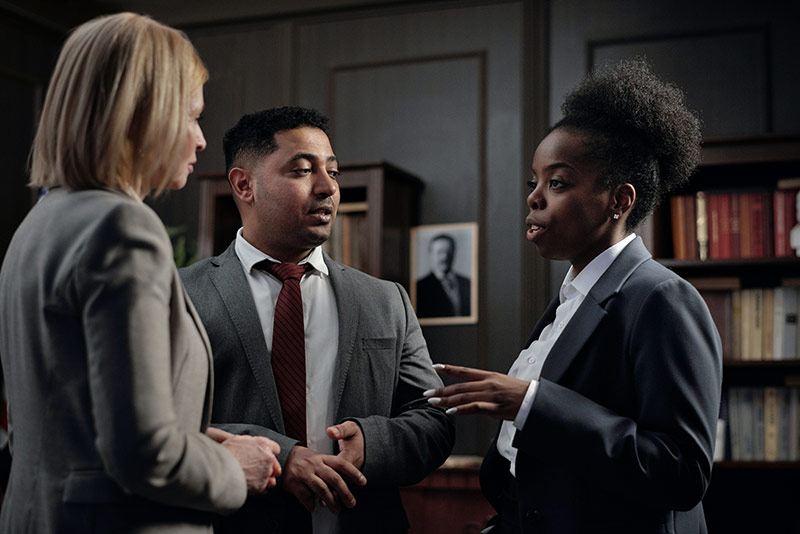If you are facing criminal charges and need an attorney, you may be wondering whether you should take a court-appointed attorney or hire a private one. This is just one of the many decisions you will need to make, albeit a very important one. Other considerations you’ll have are whether you should plead guilty or not guilty and whether you should take the punishment that the prosecutor is suggesting.
Your attorney should be able to advise you on many of the other considerations for your specific case. Regardless of whether you have a court-appointed or private attorney, you can benefit from the legal advice an experienced attorney offers. But, is it better to secure a private attorney? What are the differences between court-appointed and private? At Coolidge Law Firm, our experienced criminal defense team provides both aggressiveness in your defense as well as compassion for your situation. In this article, we will give you some of the different aspects of getting a court-appointed attorney and hiring a private attorney that can inform you in making this very important decision.
Court-Appointed Attorney
According to the U.S. Constitution, a defendant in a criminal case has the right to an attorney and must be given an attorney if he/she can’t afford to hire a private lawyer. Such an attorney is called a court-appointed attorney, or a public defense attorney. These attorneys are appointed by the state in order to provide representation for the criminal defendant during the legal proceedings.
Requesting an Attorney
An attorney that is appointed by the court is a licensed attorney and is free for cases where the defendant has been involved in a jailable offense. The defendant can request an attorney, but is assigned one automatically even if he/she doesn’t make a request. The first opportunity for the defendant to make the request is during the arraignment when the charges are brought against the defendant, and can also make a request during the bail hearing.
Some courts will delay the case and appoint an attorney once they have reviewed and approved the defendant’s eligibility in terms of financial circumstances. The defendant is required to provide proof that he/she can’t afford to hire an attorney. The severity of the crime is also considered. A minor crime doesn’t take as long to try as a more serious crime that requires a lengthy and complicated trial and, therefore, incurs greater expense.
Changing a Court-Appointed Attorney
Once you are assigned an attorney, in the event you are not happy with your representation, it is highly unlikely that you can get another one assigned to you. The defendant has to prove that the representation provided by the court-appointed attorney is incompetent, and this can be difficult to do. Incompatibility is not a qualifying factor when requesting a new public defender.
Large Caseloads
Because so many people are unable to afford hiring a private attorney, public defenders experience large caseloads which makes them overworked. As government employees, court-appointed attorneys make much less money than private attorneys. This situation can precipitate mistakes due to less time to prepare.
Limited Time Available
Due to the caseload a court-appointed attorney has, a defendant may not get very much time to meet with the attorney. Many times, you may only get a few minutes before a plea is entered. Public defenders may try to plead as many cases as possible in an effort to handle the large caseload. With so little time available, a court-appointed attorney may not be able to take the time and energy to give attention to each case. As a result, the best legal defense to minimize the impact of a conviction might not be pursued.
Private Attorney of My Choice
A private attorney is one whom the defendant or the defendant’s family personally selects and pays for. If the case is a serious one, the expenses can be high.
Smaller Caseloads
A private attorney has a much smaller caseload than a public defender, and this translates to more time available for meeting with the defendant and preparing a defense. Having more time to meet means the attorney can get to know the defendant and discover information that can help the defense. The attorney can then strategize and exploit weaknesses in the prosecution’s case that may get the case dismissed or the charges reduced.
More Resources
There may be more resources available since the legal services are being paid for. Such things as expert witnesses to testify toward key aspects of the case, labs to test evidence, and private investigators to uncover important evidence may be possible in aiding the defendant’s case. Also, a private attorney has staff such as associates and paralegals that assist in developing and support the case.
Easier Access
Private attorneys are easier to contact than a public defender is. Again, because the caseload is smaller, you have more one-on-one access through their office or by phone.
The Ability to Change
When you are paying for an attorney’s services, if things aren’t going as you would like, you can make a change and get a different attorney. A private attorney relies on satisfied clients to maintain their business and reputation, which creates incentive for them to do a good job.
Speak to a Criminal Defense Attorney in Raleigh Today!
If you have been charged or think you may be charged for a criminal offense, whether it’s a felony or misdemeanor, call Coolidge Law Firm. Our experienced criminal defense attorneys can advise you on preparing for your case. We serve all of Wake County including Raleigh, Durham, Wake Forest, Garner, Cary, and surrounding areas. Call us at (919) 239-8448 or complete the contact form below.



